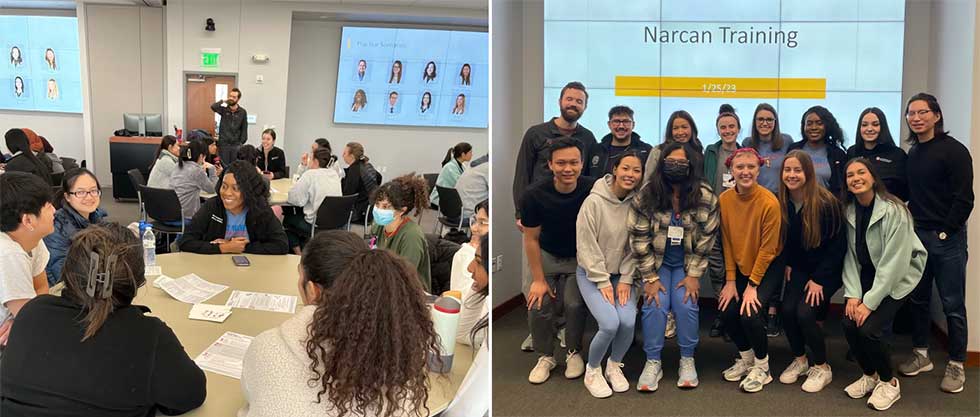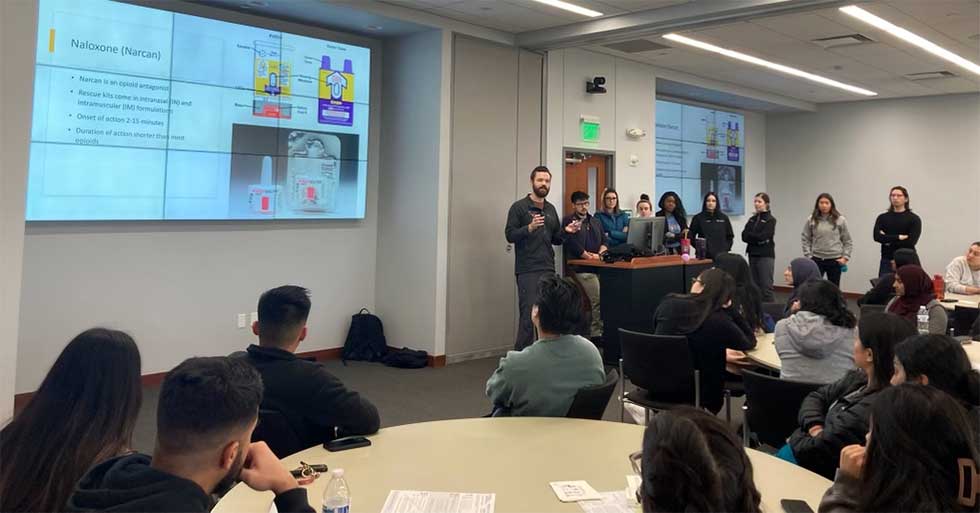Fort Worth medical students in action – Narcan training hosted by Texas College of Osteopathic Medicineby Katy Wyszynski
The United States has an overdose epidemic that appears to worsen every year. The CDC reports that in 2021 there were 50,943 total overdose deaths1, and even that potentially is an under-estimate. Yet the CDC also reports that 66.8% of these overdose deaths had the potential for an intervention to provide life-saving care at the time of the overdose. Naloxone is one of those life-saving interventions. What is naloxone (commonly known as Narcan®)? Naloxone is an FDA approved medication to rapidly reverse opioid overdose2. It works as an opioid antagonist and blocks the effect of prescription opioids and other common street drugs such as heroin, morphine, and oxycodone. In addition, Narcan is very easy to administer as most commonly it’s packaged as an intra-nasal spray. Second year medical students at the Texas College of Osteopathic Medicine (TCOM) in Fort Worth, Texas saw an opportunity to host a Narcan training event for their peers. Katherine Young and Natalia Wiemann (OMS-II) came together and were inspired to host a Narcan training at TCOM. They noticed that during orientation, first year medical students are currently instructed on how perform CPR and how to stop the bleed. Why not teach them how to administer life-saving medication for an overdose? In January 2023, Narcan training was hosted collaboratively by TCOM’s emergency medicine interest group, addiction medicine interest group, and street medicine interest group. The training was provided by Dr. Hunter Scarborough, MD, emergency medicine physician at John Peter Smith (JPS) hospital. In addition, multiple emergency medicine residents at JPS assisted in training over 100 medical students in the administration of Narcan. Dr. Scarborough states that “opioid overdose is becoming much more common both in hospital and community settings. It is important for medical providers of all levels of training to be experienced with Narcan administration so that they can reverse overdoses as well as teach community members how to use Narcan.” This huge endeavor was also supported by the Office of Medical Student Success at TCOM. Dr. Rynn Ziller, assistant dean of the office, felt compelled to make this training happen. Through her work at TCOM, she learned about Narcan and the ease of administering it. “I was moved because I realized even though I’m not a healthcare provider, this is something that even I could do to help save a life if the situation presented itself” Dr. Ziller told me. “I was excited when current students came to me with a plan to offer training to current TCOM students with the help of some [John Peter Smith emergency medicine] residents. I was honored to support them in any way possible. I believe these initiatives support our institutional values of collaboration, being visionary and most important, serving others.”
I also had the opportunity of interviewing student leaders Katherine and Natalia at the event. Katy Wyszynski: Tell me a little about your leadership at TCOM and what inspired you to want to host a Narcan training event? KW: Why do you think it’s important to teach medical students about Narcan? KW: So far in medical school, what if any formal education have you received about Narcan and addiction medicine? Do you feel like this training is a good supplement to the education provided in the classroom? KW: Finally, what do you think students will take away from this training session? Dr. Scarborough agrees on that point, that training and recognizing overdoses in medical schools will help build a safer community. He believes that “training in administering Narcan should be taught along with BLS/CPR classes, not just in medical school, but also in the community. There is virtually no downside to administering Narcan, so the more people who know how to use it, the more lives will be saved.” Anyone can purchase Narcan at a pharmacy without the need for a prescription from a doctor. For more information about Narcan, please visit https://www.narcan.com/ If your school wants to host a Narcan training event and has more questions, feel free to reach out to [email protected] References: |


